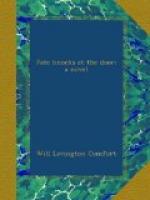“Oh, that I were a hundred men—to die before all men—to die daily!” he cried out. “But I shall live. I shall live with the poor. I shall feed them the bread of the body; and, if I may, the bread of life. I shall be brother to the poor, and they shall hear of their kingdoms.... Oh, God, help me to utter the glory of life, the sublimity of the human soul!”
And now he saw the terrible need of pity for those who wrap themselves in the softest furs, who feed upon the breasts of doves and drink the spirit of purple and golden grapes—those whom the world serves, and who are so arrogant in their regality. He must not forecast the falling of such, but pity them—and speak, if they would listen—for their need is often greater than that of the menials who cringe before their empty greatness, blinded by their kingly trappings. The world so often betrays them at the end, strips them to nakedness and leaves them to die—for they are the cripples, the sick, the blind in spirit.... Delicately he must attend the brutal and arrogant; not hate them, even when he perceives their devastation among the poor. Everywhere to give tokens of his health and power.
His love came back—as in lightning, his love came back! Not the love of one that he had known—that was good, inevitable, even the restless agony of it. Through the love of one, comes the love of many.... But this was love of the world! It surged over, through him—like the fire of the burning bush—that did not devour.... He had abstained from evil before, but held the taste for certain evils. Now the taste was gone—for every fleshly thing. Wanting nothing, he could love, indeed.
* * * * *
How strange and wonderful! All that he had thought before, and expressed in New York, had seemed his very own—the realizations of Andrew Bedient—but this night his every thought, almost, had a parallel, from one or another of the great ones who had gone this high way before.... He perceived that he had been old in self-consciousness, so, that, in a way, his New York utterances were stamped with his own individuality. In this greater consciousness he was a child; its glory was beyond words. He could only echo the attempts of those whose lips had faltered with ecstasy.
If any man is in Christ, he is a new creature; the old things are passed away; behold, they are become new.
Such was Paul’s clear saying.... The difference between Andrew Bedient at this hour and the self he had been was great as that between the simple consciousness of the ox and the self-consciousness of man.
This was the borderland of Gautama’s Nirvana; this the Living Water, Jesus offered to the woman at the well; this the Holy Ghost that appeared unto the Hebrew saints and prophets—Moses, Gideon, Samuel, Isaiah, Stephen; this the genius of Paul, the ecstasy of Plotinus, the paradise of Behmen, the heavenly light of St. John of the Cross; this, the Beatrice of Dante, the Gabriel of Mahomet, the Master Peter of Roger Bacon, the Seraphita of Balzac, the radiant companion of Whitman, and the I of Edward Carpenter.




